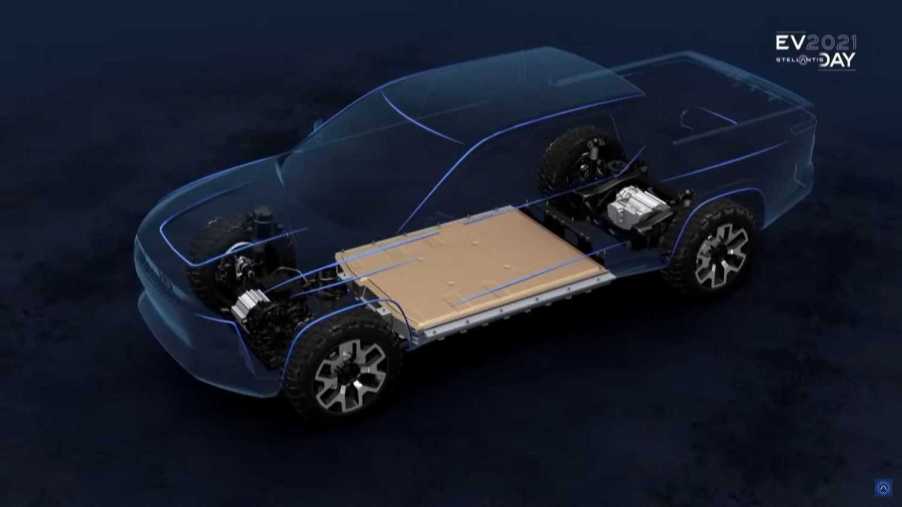
Here’s How the Ram 1500 With a Range Extender May Be Different Than Your Plug-in Hybrid
Ford’s F-150 Lightning electric pickup truck is already in production and the Silverado EV is hot on its heels. But Ram is taking its time. The Detroit company doesn’t plan to drop its electric truck until at least 2024. Ram is using that time to engineer segment-leading technologies including solid-state batteries and a range extender.
Ram has been teasing a Range Electric Paradigm Breaker (REPB) for some time now

Stellantis held its 2021 “EV Day” press conference back in July. Ram took the opportunity to update the world on the progress of its electric Ram 1500. The company revealed that it is pursuing two separate classes of electric vehicle.
The first is a standard battery electric vehicle (BEV), similar to the SVT-reminiscent F-150 Lightning and the Avalanche-reminiscent Silverado EV. BEV trucks, especially with multiple motors, boast power, trailering, cornering, and efficiency completely unheard of in the pickup segment.
Ram was a bit more hush-hush about the definition of the second class. But Ram gave us a name: the Range Electric Paradigm Breaker (REPB).
Back in January 2022, I wrote that the REPB is likely a Ram 1500 BEV with a gasoline-powered generator in the bed. BMW has pioneered a similar device, advertised as a “range extender” for its i3. I weighed several factors before guessing that the new Ram EV would offer a range extender.
Firstly, Stellantis is already building plug-in hybrids, namely the Jeep 4xe, and calling them just that–not REPBs. Secondly, range extenders are surprisingly efficient: With the BMW i3’s two-cylinder generator buzzing along–charging the lithium-ion battery which in turn spins the electric moto–the car maintains an impressive 35 mpg. Thirdly, a large gasoline generator and fuel tank in the bed of Ram’s new truck would have more uses than extending range: The Ram could also offer indefinite 220 volt power on a job site or in an emergency.
CEO confirmed a range extender version of the Ram BEV

Ram’s CEO, Mike Koval Jr., spoke with EV Pulse at the Chicago Auto Show in February 2022. EV Pulse reports that Koval said a “ranger extender version” of Ram’s “fully-electric pickup truck” will offer “‘class shattering’ range.”
There are two types of rang-extended electric vehicles. The first is a plug-in hybrid, like the Chevy Volt or the Jeep 4xe. These are versions of internal combustion vehicles with powerful electric motors capable of propelling the vehicle at full speed. Unlike early hybrids, plug-in hybrids have large battery packs which you can charge like full BEVs. These batteries afford owners enough fully-electric power for most commutes.
One defining attribute of a plug-in hybrid is what happens when the battery runs out of juice: The traditional gasoline engine fires up and spins the drivetrain on its own.
But a BEV with a range extender, like the BMW i3, is based on an electric vehicle. Its gasoline engine is not connected to the drivetrain. In these vehicles, the gasoline engine (or potentially diesel engine) is simply a generator that charges up the battery. The battery, in turn, powers the electric motors.
From Koval’s description, it is obvious Ram is working on a version of the 1500 BEV with some form of a range-extender generator.
Range extender technology is nothing new

Does a gasoline engine that charges a lithium-ion battery that in turn spins electric motors sound all kinds of complicated? Does this drivetrain seem far too experimental for a mainstream American automaker? Well, rest assured, the Ram 1500 REPB is not as outlandish as it appears.
Firstly, Ford already patented an F-150 Lightning BEV range-extender. Ford’s device is simply a range-extender gasoline generator inside a bed-mounted toolbox. And I’m not surprised. If the future is electric, the future will have to adapt to the long-distance drives that are part of life in the American heartland.
Secondly, a generator powering an electric motor that propels a vehicle may sound improbable, but it’s not. It’s actually already very common. This drivetrain describes the ubiquitous diesel locomotive. You might even say that Ford and Ram are just miniaturizing current locomotive technology to build an unstoppable new truck.



